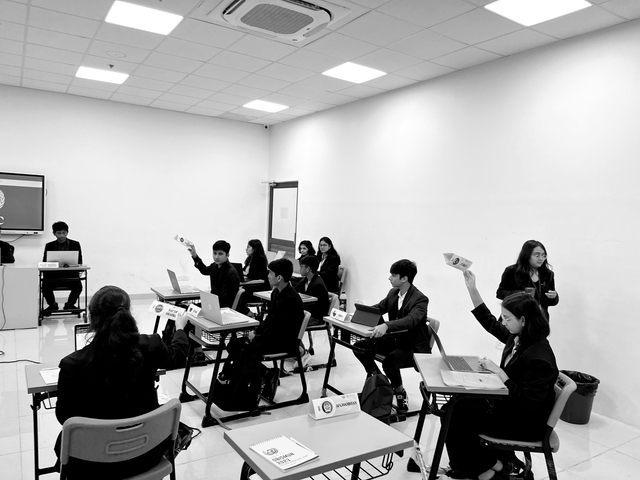Mastering the Art of Writing Award-Winning Resolutions
Vrisha Shah & Mansa Verma • 2023-05-23
Learn how to write excellent resolutions!
Participating in a Model United Nations (MUN) conference can be an exhilarating experience for high school students. One essential skill to excel in MUN is the ability to write effective resolutions. Whether you're a new delegate or a teacher guiding your students, understanding the fundamentals of resolution writing is crucial. In this article, we will explore the key aspects of crafting resolutions and provide you with practical tips to succeed in the world of MUN.
Basics of a Resolution:
A resolution serves as a comprehensive document that outlines proposed solutions to address the issues discussed in a committee. Typically, multiple delegates collaborate as sponsors to develop resolutions, fostering the spirit of consensus-building. However, it's important to note that some conferences might limit the number of resolutions per delegate or require a minimum number of sponsors and signatories for a resolution to be presented.
Writing a Resolution:
To effectively write a resolution, it's essential to understand its structure and components. Let's break down the key elements:
- Heading:
The heading of a resolution includes the committee name, sponsors, signatories, and the topic. Committee chairs often assign unique numbers to differentiate resolutions. Ensuring compliance with your conference's specific formatting guidelines is crucial.
- Preambulatory Clauses:
Pre-ambulatory clauses present the background information and context of the issue at hand. They may refer to past UN resolutions, treaties, conventions, or relevant statements by influential bodies. These clauses build the foundation for the proposed solutions. Strive for a balanced number of pre-ambulatory and operative clauses, emphasizing the availability of more solutions than problems.
- Operative Clauses:
Operative clauses outline the proposed solutions to address the issues identified in the pre-ambulatory clauses. Each operative clause should directly correspond to the pre-ambulatory clauses preceding it. It's essential to be clear and specific in your language, providing details on the "who, what, when, where, why, and how" of each resolution. Additionally, numbering the operative clauses aids in a logical progression and facilitates reference during speeches and discussions.
- Amendments:
Amendments play a significant role in modifying approved draft resolutions. They can either be friendly or unfriendly amendments. Friendly amendments are changes agreed upon by all sponsors and are automatically incorporated into the resolution. Unfriendly amendments, on the other hand, require committee voting and may involve delegates who didn't author the original resolution but see potential in it with specific modifications. Writing amendments involves adding, deleting, or changing operative clauses to enhance consensus and strengthen resolutions.
Tips to Get Started:
Now that we've covered the basics, here are some practical tips to help you excel in resolution writing:
- Familiarize Yourself with Pre-ambulatory and Operative Phrases:
Keep a list of pre-ambulatory and operative phrases readily accessible. Many MUN resources, including conference programs or websites, provide such lists. By practicing translating ideas into clauses, you'll develop fluency and be able to craft clauses effectively during committee sessions.
- Collaborate and Seek Consensus:
MUN thrives on collaboration and consensus-building. Engage with fellow delegates, exchange ideas, and seek common ground. Sharing perspectives and gathering input from others will lead to more comprehensive resolutions that garner broader support.
- Strive for Clarity and Conciseness:
While it's crucial to provide necessary details, clarity, and conciseness should be your guiding principles. Clearly articulate your solutions and their intended outcomes while avoiding unnecessary verbosity.
- Research and Stay Informed:
Thoroughly research the topic and familiarize yourself with relevant international frameworks, conventions, and past resolutions. Being well-informed will enable you to develop stronger arguments, identify effective solutions, and respond effectively to counter-arguments.
Writing resolutions is an essential skill for success in MUN conferences. By mastering the art of resolution writing, delegates demonstrate leadership, contribute to consensus-building, and increase their chances of receiving recognition. Remember to understand the structure and components of resolutions, collaborate with peers, and strive for clarity and conciseness in your writing. With practice and preparation, you'll become a proficient resolution writer, making a significant impact on your committee and leaving a lasting impression in the world of Model United Nations.
See More Posts
Don Bosco International Model United Nations 2024
Don Bosco International School, Nathalal Parekh Marg, Matunga, Mumbai - 400019
Copyright © 2024 DBIS, Inc. All rights reserved.



